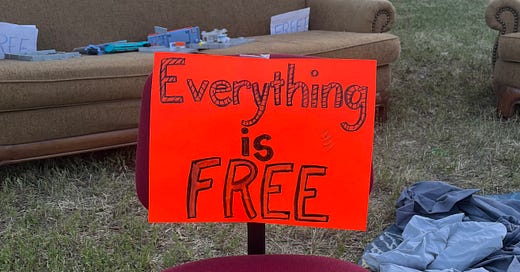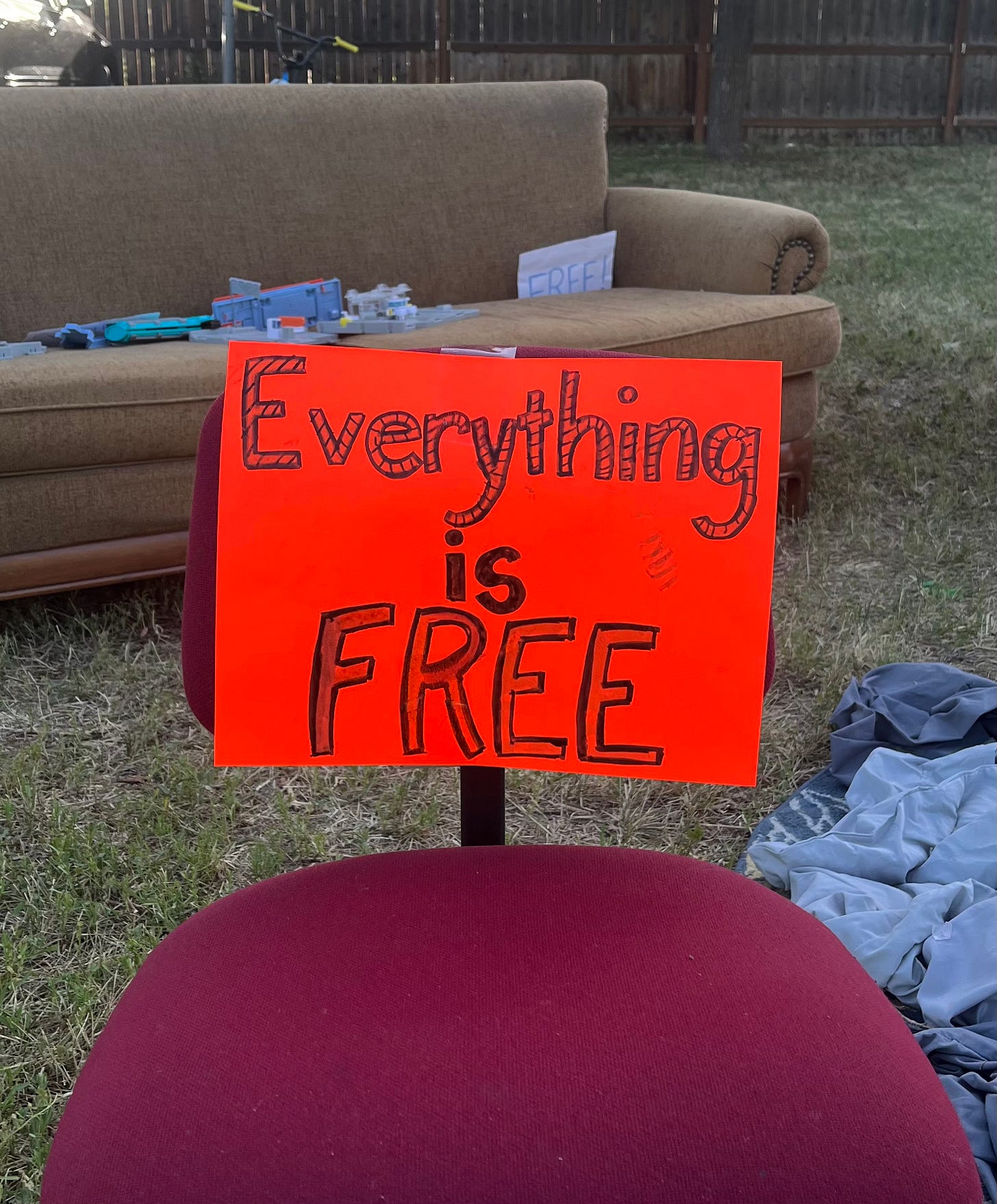This piece is the second installment of a larger work— what I’ve decided to call it “a written dérive”.
What began as an attempt to write about a walk has become an exercise in writing as walking— wandering, looping, following instinct, and trusting that the path will lead somewhere meaningful. I hope you enjoy the journey.
The sidewalk curves left, guiding me through a street of houses likely built around the time I was born. I’m glad I left my headphones at home. I love listening to music, but it has a way of making you bend to its rhythm and march to its beat. With naked ears, I have a chance to listen to the sounds around me— the birds chirping in the trees, the wind rustling through the grass, the arrhythmic dribbling from the pickup game across the street.
The cacophony of disparate sound coalesces into something unified—what the Arthur theme song called "the rhythm of the street." But it’s not just around me, it’s in me. My breath, my footsteps, my pulse—they're already keeping time with it. I am part of the rhythm of the world, and inversely, the rhythm of the world becomes the rhythm of my walk. And once the walk has a rhythm— the thoughts follow. They always do. Another strange loop with no beginning. I zoom out to view another layer of my train of thought, which is now looping around the tracks in a tight spiral.1
"The decision to go left instead of right is still winding the gears of my thoughts."
"Well, technically, the coin made the decision."
"Did it, though? I was the one who flipped it."
"So was it your choice, or the coin’s?"
"Maybe a joint decision between me and the laws of numismatic physics."
"Alright, that’s fair."
"Who am I talking to right now?"
"Yourself."
"And who are you?"
"Yourself."
"So I’m talking to myself, then."
"Obviously. You do this all the time. It’s called having an internal monologue. Or, I guess, internal dialogue in this case."
"Yeah, yeah, I know that. (Of course I do. I’m you.)"
“Wait, so if I’m you, and you’re me— who’s flying this plane?”
"That’s something that I think about a lot”
“Me too! (duh) Cause if the self is unified, then what is self-discipline? How can I fight against myself?”
And just as my mind threatens to spin itself into an infinite recursion of self-referential paradoxes, a sharp gust of wind cuts through the street.
The leaves scatter. A loose piece of newspaper tumbles end over end down the sidewalk.
And just ahead—
A faded maroon swivel chair.
A bright orange sign, taped to the front.
A proclamation written in black marker:
EVERYTHING IS FREE.
I stop.
The wind holds its breath.
The chair waits.
Everything is free? Everything?
In this economy??
Well this is an excellent turn of events. I am about to become a very rich man. But I don’t want to get too far ahead of myself. I’m still a bit skeptical.
This grand metaphysical proclamation about the nature of ownership, commerce, and free will is presented in the most innocuous, unassuming form possible.
It’s Bold. Sweeping.
If I had to rank history’s boldest proclamations, it’d go:
"I am the way, the truth, and the life."
“Now I am become Death, the destroyer of worlds.”
"EVERYTHING IS FREE."
I scan the street, looking for evidence of this revolutionary policy reform. Nothing. Just a couple of parked cars and a guy walking his dog, looking way too relaxed for someone who apparently just stumbled into a socialist utopia.
Alright, maybe I’m not meant to take this thing literally. So what exactly is the scope for this non-all-inclusive offer of everything? Are we talking just this chair? The books on the table? The table itself?
What if I just start pointing at things? The house? The car in the driveway? The dog?
Or—and hear me out—does this extend beyond the property line?
Like, let’s say I walk down the street, enter a grocery store, grab a couple of avocados. Can I just flash them this sign?
Like, “No no, it’s cool, I have diplomatic immunity. EVERYTHING is free.”
At this point, I’m starting to suspect a scam.
Maybe this is like one of those bad credit card promotions where "everything is free" for three months, and then suddenly I start getting billed for items I took under false pretenses.
Or worse—maybe it’s a social experiment.
I look around again to see if John Quiñones is crouched behind a bush somewhere, ready to pop out and ask me why I started looting the neighborhood.
But what if whoever wrote the sign wasn’t even speaking in material terms at all? Maybe this isn’t a sign at all. Maybe it’s a Zen Koan, daring me to interpret it on a higher plane. Everything is Free. The universe is untethered. We may be chained down to our bodies and egos but we are ultimately part of something way bigger, way more autonomous. All is sovereign.
It’s true isn’t it? Everything IS free.
The sky doesn’t cost a dime. The feeling of wind whipping through your hair, free. The warm concrete underfoot, free. The quiet hum of a neighborhood in midafternoon, free. The whole wild machinery of the world spinning and rolling and roaring toward some unknowable destination—absolutely free.
But the moment you reach out, the moment you claim, you are owned.
You take something, now you’re on the hook. You pick up the chair—congrats! Now you have to carry it, clean it, protect it, worry about it. Now you have to find a place to put it. Buy a house? Now you have a mortgage, an anchor, a stake in the ground pinning you to one little dot on the map. Owning things is just a subscription service with no cancel button.
The only way to be free is to keep your hands empty.
And I laugh, right there on the sidewalk, because maybe the sign isn’t offering me anything. Maybe it’s warning me.
Everything is free as long as you don’t take a damn thing.
I walk on, lighter now, though not necessarily freer. The air around me shifts, but something remains. Something unsettled.
I am thinking about signs.
Some call them omens. Others—coincidences.
Miracles and syncronicities.
There are those who say God is speaking, leaving breadcrumbs for those who have the wisdom to follow.
There are those who say the world is chaos, cruel and indifferent, and any pattern we see is only the desperate invention of the mind, stitching meaning into the fabric of chance.
There are those who say it is memory playing its tricks, Baader-Meinhof hijacking the brain, painting the world in familiar colors, making ghosts of patterns that were never there.
Maybe all omens are just thoughts that haven’t yet realized they belong to us.2
Maybe they linger on the periphery of the mind, forming in some hidden chamber where the conscious and unconscious touch—waiting, like an unopened letter, for the right moment to be recognized.
A magpie. A flickering streetlight. A phrase overheard at just the right (or wrong) moment—what if these aren’t signs from the universe, but messages we’ve sent to ourselves? Tiny bubbles of thought, rising through the depths, breaking the surface of reality.
The world does not give answers freely. But maybe the subconscious does—if we are quiet enough to listen.
I keep walking— wondering if the sign was waiting for me, or if I was waiting for it.
My high school biology teacher would tell us: “life is loopy” at the end of every class and that phrase has played an increasingly significant role in my life over the years.
This is why omens often feel like recognition, rather than revelation. Like déjà vu—but for meaning. It’s less “the universe is talking to me” and more “oh, I’ve been telling myself this the whole time.”





Nothing is free dear